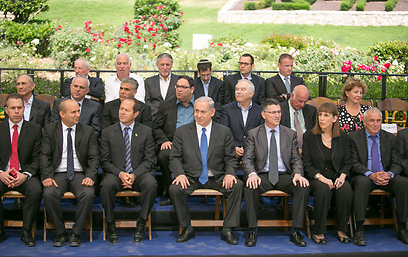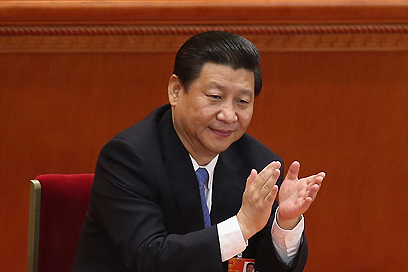Despite tensions on northern border, visit to China continues as planned. On agenda: Trade relations & far more serious sanctions on Iran.
By Atilla Somfalvi
Even as things heat up in the north, Prime Minister Benjamin Netanyahu took off for China, with a slight two hour delay, due to the situation on the Syrian front. The main issues scheduled for discussion during the prime minister’s China meetings include economics and Iran.

Special cabinet meeting convened Sunday – Photo: Noam Moskovich
Sunday morning Netanyahu made no mention of the attacks on Syria, for which Israeli officials had told news agencies that Israel was responsible. Before he took off, the cabinet was convened.
Netanyahu is traveling to Beijing with his wife Sarah and their children, Yair and Avner. During his absence, Defense Minister Moshe Ya’alon will fill his position.
Israel wants to significantly grow trade relations, currently estimated at about eight billion dollars a year, between the two countries. The division between export and import, however, is not in Israel’s favor: nearly two-thirds of the eight billion dollars changing hands between the two countries reaches Chinese pockets. This is due to large amounts of “Made in China” products flooding the Israeli market.
“There has been a significant jump in economic relations between the two countries over the past three years,” said former Finance Minister Yuval Steinitz, who worked to strengthen trade ties between the two nations. “There was a big jump in exports to China, but it is still not enough. There should be another leap in the coming years, to have a balance between exports and imports.”
Video courtesy of jn1.tv
Israel views China and India as the two economic powers of the future.In Jerusalem, there are those who believe that strengthening economic relations with Beijing will help the Israeli economy weather the global economic crisis.
Since mid-2010, the Chinese have poured close to NIS 25-billion into various Israeli projects after the Chinese government gave the green light to Chinese companies desiring to invest in the holy land. Netanyahu hopes that new trade agreements will increase Chinese investment in Israel and grow Israeli exports to China.
“Our first focus is the Chinese economic front,” said Deputy Foreign Minister Zeev Elkin. “The prime minister made it clear last week that we have a strong interest in going deeper into the Chinese market. Every advance in trade relations between the two countries can give a very serious boost to the Israeli economy.”
Such a boost can also come from trading in arms and Israeli military technologies. The Chinese are very interested in what the military industries and the Israelis want to sell, but the US has vetoed trade in arms and technologies.
“Ever since the Falcon episode (an intelligence spy plane built by Israel for the Chinese whose sale was canceled due to US pressure), the Americans are not willing to hear of trade with the Chinese,” said a senior diplomatic source.
“Because of the US, we have no military trade with them, even though they really want it. We decided not to deal with this area because it caused severe tension with the Americans.”
Israel wants China to support Iran sanctions
Money is certainly important, but during his visit, Netanyahu will try to convince the new leadership of China to support the intensification of sanctions against Iran.

Chinese President Xi Jinping – Photo: Gettyimages
China has traditionally halted strong measures against Iran, but recently – perhaps due to the influence of US President Barack Obama – something in Beijing has changed.
“They have a slight improvement regarding the Iranian issue,” says International Relations Minister Yuval Steinitz. “They suddenly began to understand that if Iran produces a bomb, they will become a nuclear power, an Islamic nuclear power.”
China, one of the world’s largest energy consumers, also stopped buying oil from Iran and in the last round supported harsher sanctions in the Security Council.
Economically, the Chinese are working to prevent Chinese companies from trading with Iranian companies, and in Israel it is noted with satisfaction that “when they are informed of Chinese companies not adhering to sanctions, they immediately act to fix this.”
The Foreign Ministry said that although the Chinese do not want a nuclear Iran, they are still taking the most conciliatory approach towards the Ayatollah regime. “We must persuade them that the near future is a critical period,” said a Foreign Ministry source.
Furthermore, the Chinese have recently expressed an interest in becoming more involved in the political process between Israel and the Palestinians. A spokesman for the Chinese government even offered to mediate between Netanyahu and Mahmoud Abbas, head of the Palestinian Authority, who is also visiting China this week. But it is doubtful that the Chinese will have substantial involvement in the stalled diplomatic process.
“They want to be more involved,” said an Israeli official, “but obviously they are not a real player in this story. The Chinese were on the side of the Palestinians and Arabs for years, and in any case, their influence in the region is minimal at this stage.”
Abbas said on Sunday that during his meetings with the Chinese, he intends to raise the subject of difficulties in negotiations between the Palestinians and Israel. He also plans to ask the Chinese leadership to use its relations with Israel to assist in the removal of restrictions on the Palestinian economy.
Regarding the proximity of Netanyahu‘s visit with his, Abbas said, “This is a good opportunity for the Chinese to listen to both sides.”
View original Ynet publication at: http://www.ynetnews.com/articles/0,7340,L-4376349,00.html







 Israeli New Shekel Exchange Rate
Israeli New Shekel Exchange Rate